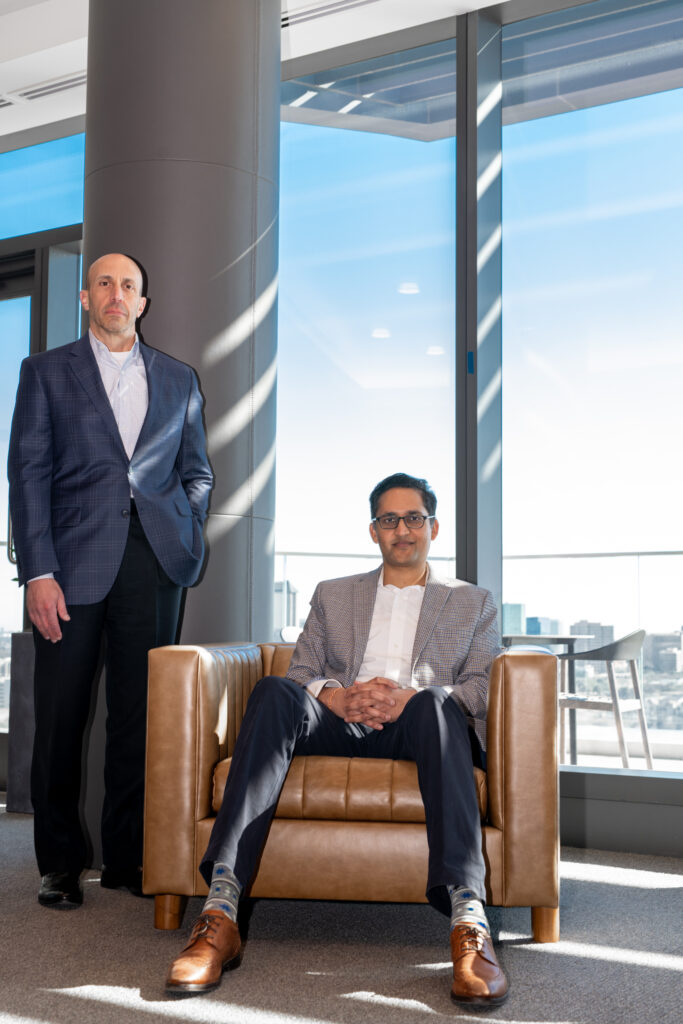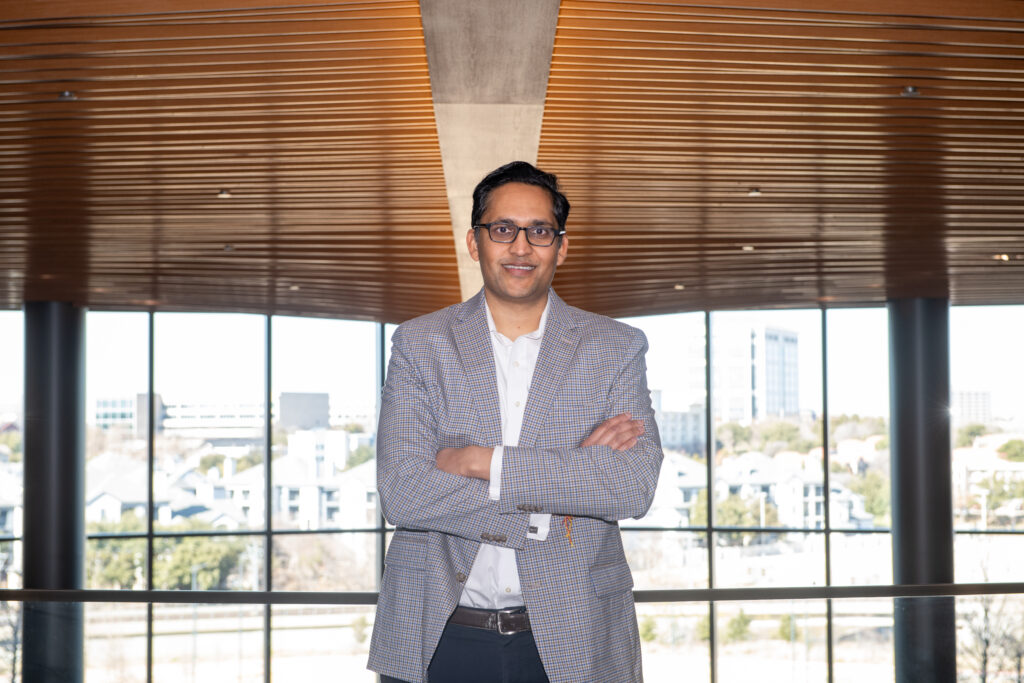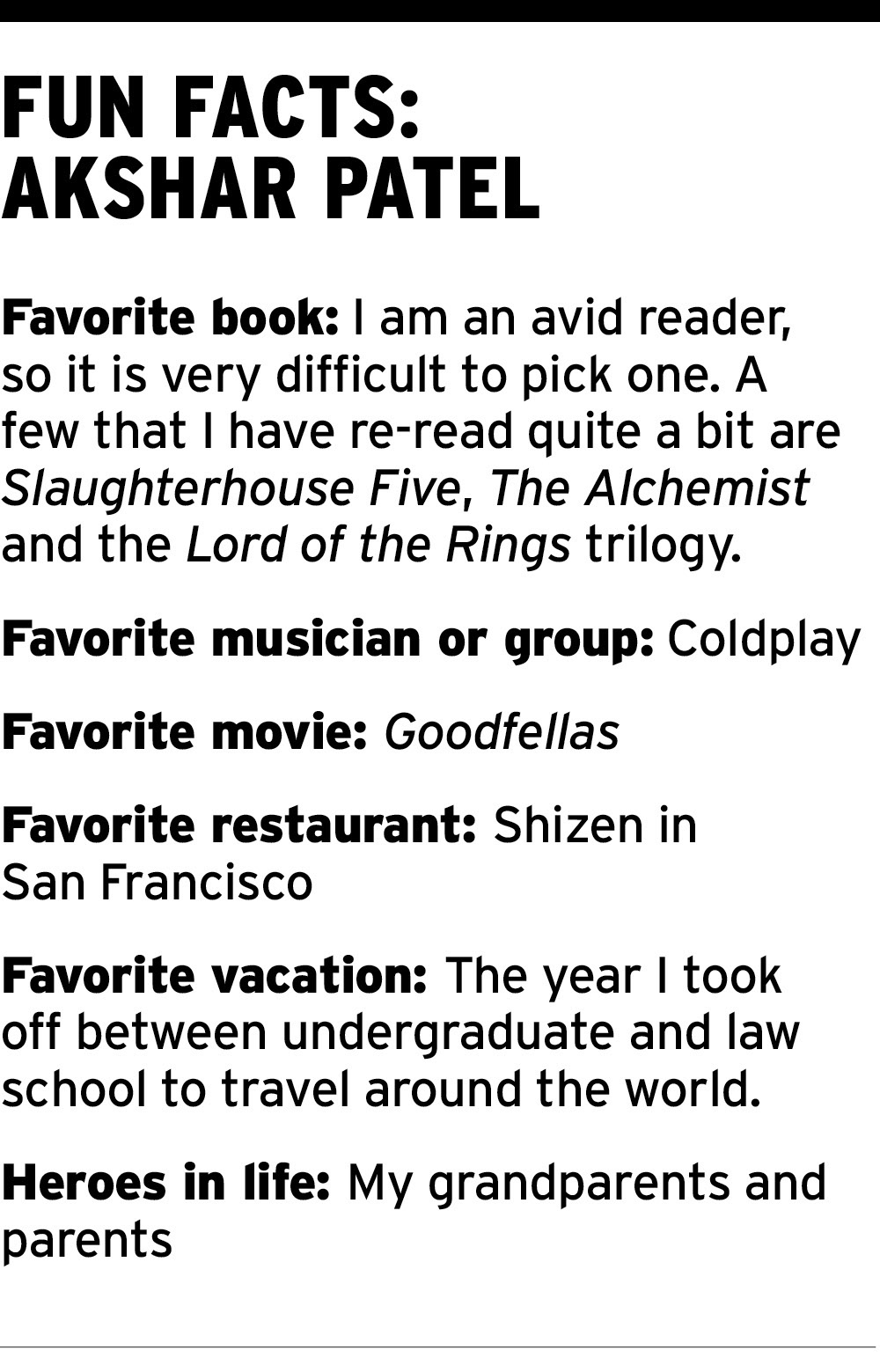
Akshar Patel was 9 years old when he and his parents stepped off the plane from Los Angeles.
“It was a beautiful 80 degrees when we left John Wayne Airport, and suddenly 98 degrees when we landed at DFW and the sun blazing in my face,” he said. “I remember looking at my parents and said, ‘Why?’ But I have come to love Dallas.”
Patel has always been a prodigy, graduating summa cum laude at 19 and law school at 21, where he was an editor at SMU Dedman School of Law’s International Law Journal. He had four years of corporate law practice on his resume and was associate general counsel at Flowserve Corporation at 26.
Now a ripe old 38, Patel is the corporate secretary and vice president of legal at Pioneer Natural Resources, where he played a critical role in the October 2023 $64.5 billion acquisition of Pioneer by Exxon Mobil.
“Akshar has the ability to think strategically and mitigate risks to drive optimal results for Pioneer [because] he understands that the best general counsel, while always attentive to legal requirements, drive the greatest value by being business people first,” said Jeff Chapman, a partner at Gibson, Dunn & Crutcher in Dallas. “He played an instrumental role in orchestrating the largest deal signed in the entire world in 2023.”
“To quote the great sage Adam Sandler, ‘Not too shabby,’” said Chapman, who was lead outside counsel for Pioneer on the Exxon Mobil transaction.
Citing his extraordinary work on the Exxon Mobil deal, the Association of Corporate Counsel’s DFW Chapter and The Texas Lawbook are honoring Patel with the 2023 DFW Corporate Counsel Award for Corporate Secretary/Legal Counselor of the Year.
Premium Subscriber Q&A: The Lawbook visited with Patel about his best day working at Pioneer and factors he considers when hiring outside counsel.
ACC-DFW and The Lawbook will celebrate Patel and the other finalists and winners of the 2023 DFW Corporate Counsel Awards this Thursday, Jan. 25, at the George W. Bush Institute.
“[Akshar] is a thoughtful and thorough decision-maker who considers the potential consequences and ramifications of his advice,” said Pioneer Natural Resources General Counsel Mark Kleinman. “Nowhere were these traits more evident and valuable than when he counseled Pioneer’s management team and board of directors on the aspects and implications of the potential transaction with Exxon Mobil.”
“By far his biggest success has been quickly earning the respect of the members of Pioneer’s executive committee and board as a trusted adviser,” Kleinman (pictured below with Patel) said.

In an interview with The Texas Lawbook, Patel said that no two days at Pioneer have been the same, but that negotiating the merger agreement with Exxon Mobil has certainly been one of his most exciting experiences.
“We are in a time of incredible change and transformation in the energy industry, and with that comes a lot of opportunity,” he said. “Since the onset of Covid, it has been a whirlwind for our company and, as a lawyer that supports our business leaders and board, has resulted in an incredible amount of work and responsibility in advising them in assessing various strategic opportunities and potential investments. It has been an incredible learning experience for me navigating all the challenges we have faced.”
Patel said the role of corporate secretary has “a slight wrinkle when compared to my hat as a senior member of the management team.”
“While Mark and I worked hand-in-hand with our management team to advance our corporate strategy and initiatives — and in the case of the Exxon merger, negotiate the transaction and the critical documents — my role as corporate secretary added a unique aspect to my responsibilities,” he said. “As the main advisor to the board, I am often the only member of the management team present during executive sessions of the board, advising on legal implications, fiduciary responsibilities and so forth.”
“It is a responsibility that I do not take lightly,” he said.
Vinson & Elkins counsel Joanna D. Enns, whose practice focuses on corporate government and corporate board representation, said Patel manages “competing demands and complex timelines well without creating unnecessary time pressure.”
“Akshar skillfully threads the needle between technical legal compliance and satisfying commercial needs and demands of the business,” Enns said. “He manages his internal and external teams well and instills confidence in those he works with.”
Patel was born in Los Angeles. His mother was an accountant who “put her career on hold to be a stay-at-home mom until my sister and I got to high school” and then resumed her career until retirement about a year ago. His father worked for a plastics company as its head of research and development and manufacturing. His father also invested in various small businesses over the years and continues to manage them after retiring from his main career.
“I grew up surrounded by family and friends who left their home country — in some cases, twice, when factoring in the Indian expulsion in Uganda — and eventually made their way to America to find opportunity,” he said. “They all came here, worked hard, invested in and grew businesses and instilled a strong work ethic and sense of values to the next generation.”
“When I think about all of the sacrifices they made so their children would have access to more opportunities than they did, it gives me a boost to continue to grow and learn,” he said. “Additionally, they all did this with humility and never forgot to help others along the way — whether it was sponsoring others to help them immigrate to America, giving them a place to stay while they found their footing in a new country.”
Patel said he had no family members who were lawyers.
Instead, the idea of law school came as he completed his finance degree at Southern Methodist University.
“Rather than pursue an MBA that reinforced my undergrad degree, I decided that I wanted to enroll in law school to get a well-rounded perspective on business,” he said. “Coming from the Gujarati Indian community, many family members and friends that I grew up with owned and invested in family businesses. I saw firsthand how a well-rounded background in both law and business would be invaluable in making sound, well informed, strategic decisions and be a competitive advantage for me in the future.”
While in law school at SMU, Patel did clerkships for Justice Carolyn Wright of the Texas Fifth District Court of Appeals and Bankruptcy Judge Harlin Hale of the Northern District of Texas.
In 2009, he joined the corporate law practice at Baker Botts, where he worked as an associate for nearly four years.
In April 2013, Patel joined the legal department at Irving-based Flowserve Corporation, a heavy machinery manufacturer, where he served as associate general counsel and assistant corporate secretary for more than eight years.
“Flowserve is a company that has a large footprint on par with an Exxon and Shell with operations in over 50 countries, but it has the resources of a $4 billion company,” he said. “As a result, all of the teams, including the legal team, are very lean when compared to the breadth of responsibility and risk they have to cover.”
“I knew it would be a company where I would have a chance to do a large variety of legal work, all over the world, with consistent and early interaction with the executive team and board — thus accelerating my development and helping me gain the skillsets necessary to be a general counsel in the future,” he said.
In August 2021, Pioneer hired Patel as its corporate secretary and vice president of legal.

Patel said the opportunity to join Pioneer allowed him to use “the strong foundation” he earned at Flowserve and put it to use in a leadership role.
He describes Pioneer as “a Fortune 200 company … with amazing values and culture.”
“Though Pioneer is large and complex, it also has the culture of a family company where people truly come first,” he said. “It is a place where I get to do very high-stakes, complicated legal work, while still being able to prioritize the more important things in life outside of my career. This background and set of values are what drew me to Pioneer as the company lives the same culture of working hard while also taking care of one another and our various stakeholders.”
Patel pointed to Pioneer Executive Vice President Mark Berg and Pioneer Associate General Counsel Barry Thomas in their leadership roles with the Permian Strategic Partnership.

“Akshar has been a perfect for our company,” Berg said. “He has excellent judgment and a good sense on how to read a room and know when to listen and when to speak up. Despite his calendar years, Akshar’s wisdom and judgment are far beyond his years.”
“Akshar is self-effacing and doesn’t take himself too seriously, despite having such an amazing intellect,” Berg said.
Gibson Dunn partner Krista Hanvey said Akshar is “able to see the multiple sides of any issue.”
“For example, a decision that we make on an HR matter may have tax and securities disclosure implications as well as broader consequences for business operations and practical implications to getting the deal done, and Akshar is able to identify and carefully navigate those issues,” Hanvey said. “Akshar has a way of sitting quietly in a board or C-suite meeting, carefully listening to competing considerations and then focusing the discussion on the key issues that need to be resolved. He can quickly spot and resolve issues while keeping the company moving forward.”
Patel said he was involved in the Exxon Mobil merger from the start.
“There had been rumors for years about Pioneer and Exxon,” he said. “But I told the board that this was more serious — not just rumors in the Wall Street Journal but actual meetings. It all came together in three to four weeks.”
Patel said he met in person or via Zoom with board meetings “sometimes multiple times a day, and I felt like I was on the phone with Jeff [Chapman] every other hour getting updates or asking questions. Jeff thinks like a businessperson, and that matters a lot for our leadership team.”
“If you let deal discussions go on for too long, it will leak,” he said. “All deals come down to four or five main points. We realized that we needed to focus on valuation and the other critical items that really mattered.”
Even as Patel was working day and night, he was spending a significant amount of time in the small New Jersey town of Robbinsville, which is halfway between Philadelphia and New York, working on the construction of the largest Hindu temple in the country.
“Between 2016 and 2023, I spent a lot of time — often two weeks at a time — polishing stones, building the main 200-foot spiral and setting the molds for the 60-foot walls,” he said. “Last year, I was doing both the Exxon deal and the temple. I was averaging about one and a half hours of sleep each night for a month or two. It was a crazy period.”
